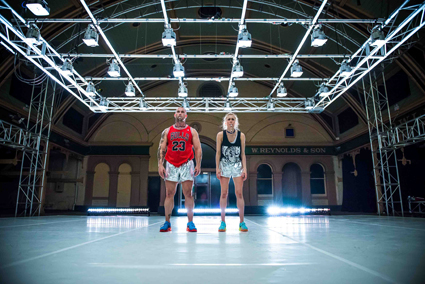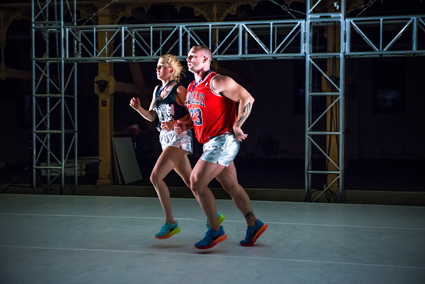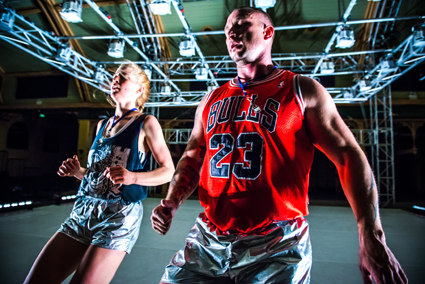In profile: Natalie Abbott, Maximum
Gail Priest

Donny Henderson-Smith, Natalie Abbott, Maxiumum
photo Gregory Lorenzutti
Donny Henderson-Smith, Natalie Abbott, Maxiumum
In Dance Massive 2013, one of the most curious and absorbing works was Physical Fractals by emerging choreographer and dancer Natalie Abbott. As a sound artist I found the completely integrated soundscape generated from the dancers’ movement in the space particularly appealing, but I was equally taken by the very strict form of the choreography—a relentless unison of simple, abstract movements drilled and repeated to create an uncompromising exploration of pattern and form. Coupled with the often harsh but organic sound score the movement was absolutely mesmerising. It seemed self-sufficient—form equalled content equalled form—with no need for imposed thematics or metaphors.
I was not alone in finding the work intriguing. Along with a strong critical response (see RT Dance Massive coverage by Varia Karipoff and Jana Perkovic) artistic director of Paris dance presenter micadanses, Chrisophe Martin, was also impressed and via a partnership with Dancehouse, Abbott’s subsequent work, Maximum, has just been presented in the OFF section of the Avignon Festival (along with Matthew Day’s Intermission, see realtime tv Keir Choreographic Award interview).
Maximum minimalism
Maximum premiered as part of Next Wave 2014 (see review RT121) and will soon hit Sydney as part of Performance Space’s upcoming SCORE festival. It sees Abbott teaming with a body builder, Donny Henderson-Smith. The original premise for the show was that Henderson-Smith would hold Abbott off the ground for 45-minutes, however as they started working Abbott saw there was much more to explore, or as she puts it, she became more interested in “asking questions of our bodies together.”
Ironically Maximum could be viewed as quite minimal. The piece begins with an almost 20-minute running sequence, in circles and then a series of floor patterns. This is followed by excruciating looking fitness drills and then a 10-minute lift sequence, Henderson-Smith holding Abbott aloft, in an heroic posture, swivelling through a full 360 degrees. The piece concludes with the duo resuming their running sequence.

Natalie Abbott, Donny Henderson-Smith, Maxiumum
photo Gregory Lorenzutti
Natalie Abbott, Donny Henderson-Smith, Maxiumum
Tough love
Abbott is aware that this is tough to watch: “I know that I’m asking a lot of my audience. That made me really nervous because generally people want to be entertained and if you’re classing your show as dance then maybe there are some particular things you need to put in there. But for me it’s really about a physical exploration and not just about entertaining. It’s about asking an audience to come up to that same level of intensity as the performers, asking [them] to persist with us and engage in a different way than in a more obviously spectacular dance show…There were definitely mixed responses to the performances in Next Wave and for me that’s good. I get information from that to take into the next season. I don’t necessarily want to please everybody, so I like getting mixed reviews.”
Presenting the work in Avignon to a different audience in a different space, (this one much smaller) has also made Abbott realise that her works are in a state of constant evolution. “Having a second season of the show has really made me think that when I put work out to the public it’s not necessarily finished. It’s an ongoing process… there are lots of things I’d still like to explore within the work, so I think for the next season we’re going to make some changes and keep experimenting with how we can push our bodies.”

Natalie Abbott, Donny Henderson-Smith, Maximum
photo Gregory Lorenzutti
Natalie Abbott, Donny Henderson-Smith, Maximum
Together apart
As in Physical Fractals, Abbott is working with a live sound score, created once again by Daniel Arnott. She says she wants it to “reflect the idea of Greek gods or some kind of ethereal creature.” There’s a microphone picking up sounds from the space that are augmented by shouts and yelps evocative of sport and military drills. These are then layered into ominous, propulsive rumbles. For Maximum Abbott has also given Arnott more agency in terms of timing and structure. “Sometimes it can be Dan leading, sometimes it can be us, other times it’s a bit blurry. I really like the idea of this external force, this outside voice influencing what happens in the performance space.”
Also like Physical Fractals the work relies heavily on synchronous movements. I ask Abbott what it is about unison that is so appealing to her and she replies, “I guess I never saw it enough or did it enough at university…I’m not interested in two people looking exactly the same. I’m interested in seeing similarities and disparities in the two people and what that brings up for you as an audience. I could watch two people attempt unison all day. I think it’s not possible and there’s a challenge in that.”
Before Abbot presents Maximum at Performance Space in late August, she will be attending the Impulstanz dance festival in Vienna, courtesy of a DanceWeb scholarship. She’s also undertaking a Jump Mentorship with Martin del Amo (no stranger to the walk or run as choreography). By the end of the year she’s hoping to get back into the studio to make her next work. I for one, will be looking forward to whatever Natalie Abbott comes up with next.
Maximum, Natalie Abbott with Donny Henderson-Smith, 27-30 Aug, Performance Space, Sydney. Presented as part of SCORE which also includes works by Jon Rose with Ensemble Offspring and Speak Perscussion, Antony Hamilton/Chunky Move, Pia van Gelder, Narelle Benjamin, Jane McKernan & Gail Priest, Kris Verdonck (Belgium); http://performancespace.com.au/events/score/; http://www.natalieabbott.net
RealTime issue #121 June-July 2014 pg. web






